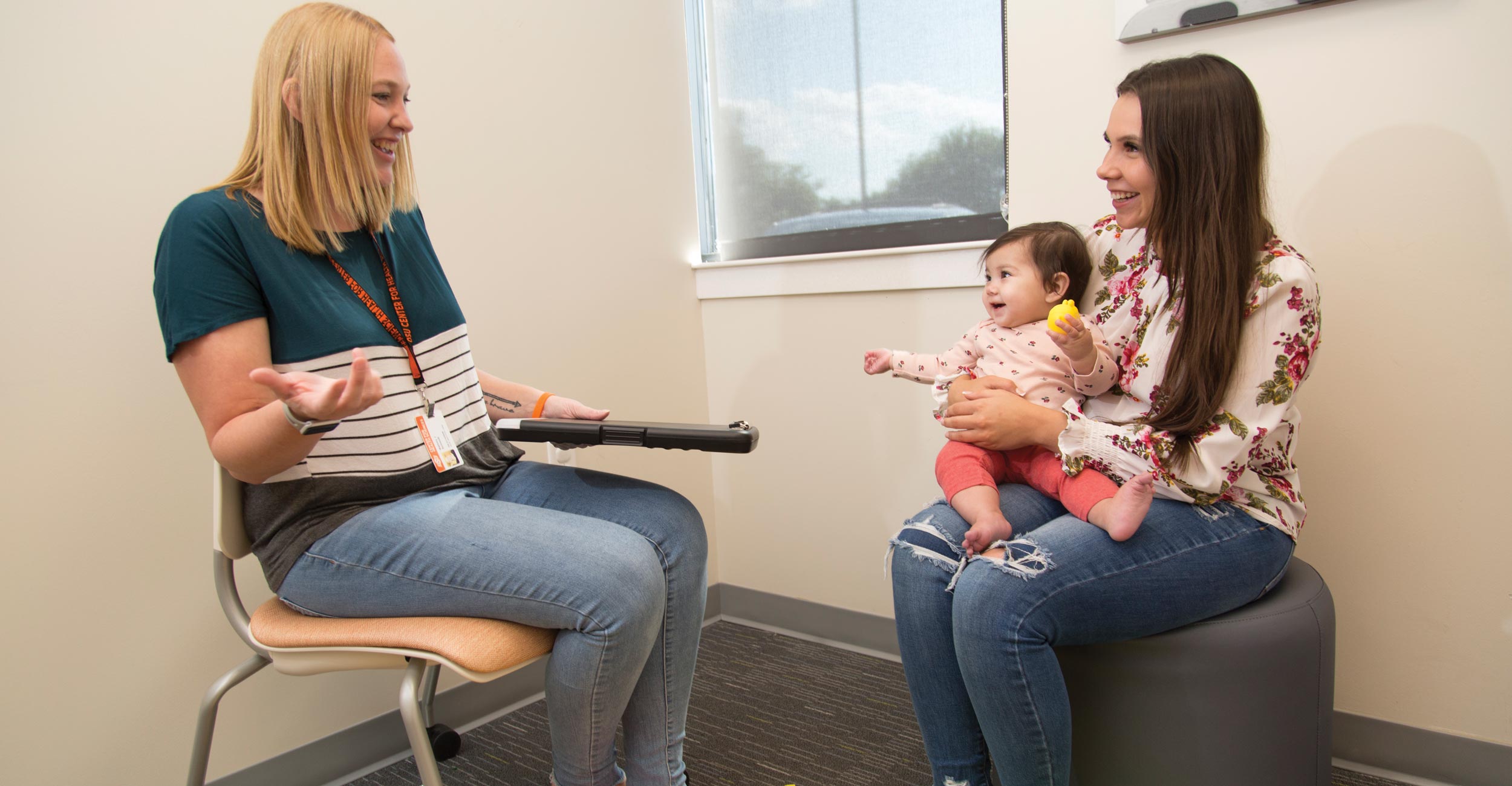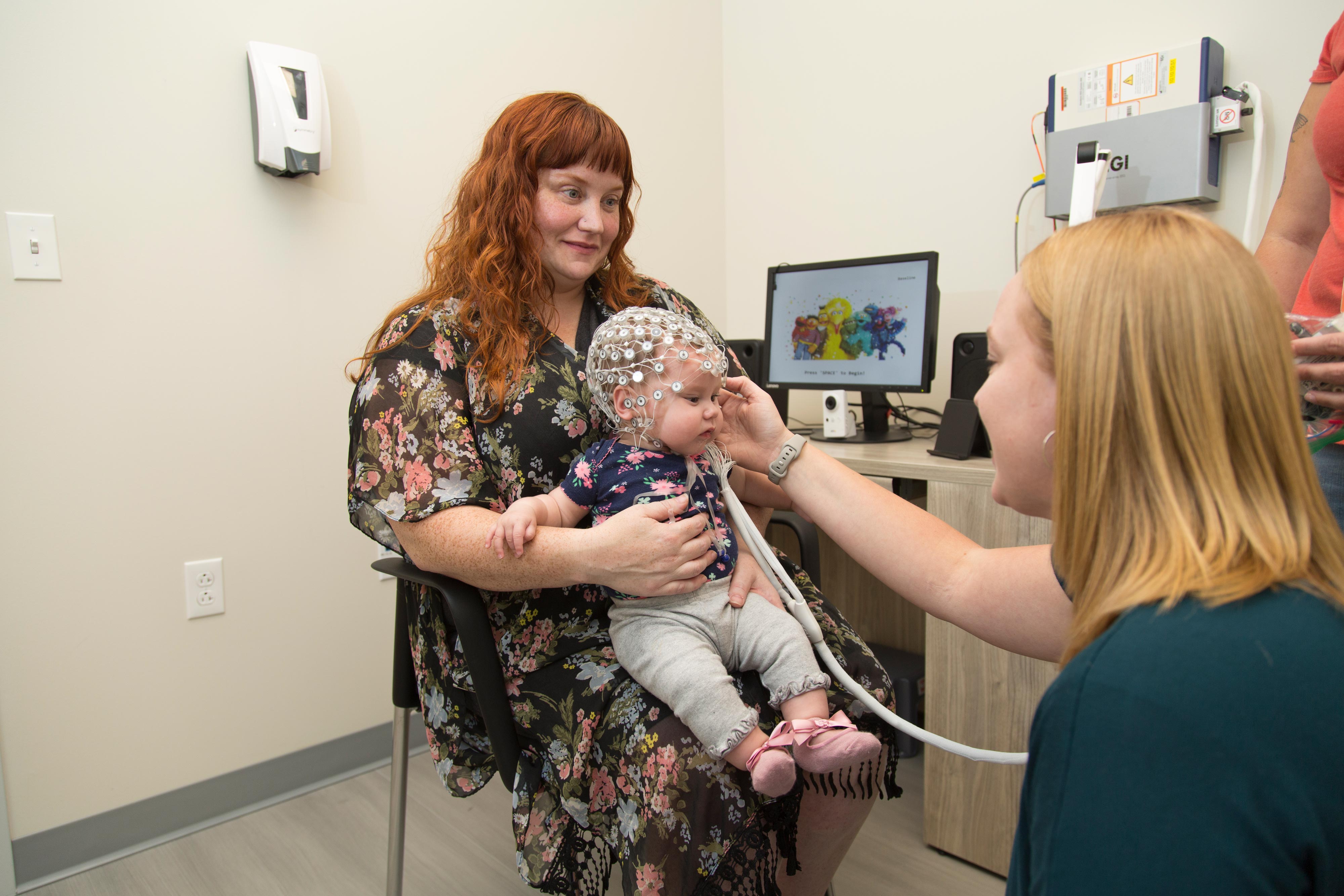
Preparing for Parenthood: OSU psychology professor studying mental health in pregnancy
Tuesday, September 19, 2023
Media Contact: Harrison Hill | Senior Research Communications Specialist | 405-744-5827 | harrison.c.hilll@okstate.edu
Even for those who have planned for pregnancy and curated a list of items they need, lined up daycare and drafted their birth plan, there is still something many overlook — mental health.
It’s not an issue many families plan for, but it can have a greatly detrimental effect on the mother and infant.
As many as 20% of people experience postpartum depression and anxiety around giving birth, said Dr. Lucia Ciciolla, associate professor of psychology at Oklahoma State University, making mental illness one of the most common complications associated with pregnancy and childbirth.
Ciciolla’s research focuses on the perinatal period, which includes pregnancy through the first year postpartum. This is a period of major biological, developmental and psychological change that is foundational for healthy child development and family functioning.
In the context of maternal mental health and the mother-infant relationship, Ciciolla is able investigate the intergenerational transmission of adversity and resilience during this critical period.
In other words, Ciciolla wants to “understand how one generation impacts the next, and how a parent’s own experiences and mental health might shape their child, through both their biology as well as through their parenting.”
Ciciolla is currently leading the Epigenetics of Mother-Baby Reactivity and Childhood Experiences study.
As part of the Center for Integrative Research on Childhood Adversity, funded by the National Institute for General Medical Sciences at the National Institutes of Health, Ciciolla leads the EMBRACE study, which focuses on the perinatal, intergenerational epigenetic pathways from maternal risk and protective factors to infant stress reactivity.
Specifically, the study examines how maternal history of adversity and supportive relationships are related to epigenetic changes to genes involved in regulating the stress hormone response, and the impact of these changes on how babies respond to and recover from stressful situations, like missing a nap or being away from their parents.
“It is about understanding how stress and adversity get under the skin and change one’s biology, and how that might get passed on to the infant, and how that might change how both the mother and infant then respond to stress and stressful situations,” Ciciolla said.
The study has three data collection points during pregnancy and postpartum. Families stay in the study until infants are 4 months old and uses questionnaires to learn about mothers’ life experiences, mental and physical health, infant development and relationships. They also collect saliva from mothers and infants to get information about epigenetic markers that alter the expression of stressrelated genes and about their actual stress hormone levels.
Results from this study are expected to help identify mother-infant stress profiles and protective factors that may be targets for interventions to promote healthy stress regulation across generations.
“This project is in line with my broader program of research and clinical work supporting maternal and infant mental health. I am hopeful this research can inform new programs to support moms and babies and promote healthy stress regulation,” Ciciolla said.
Ciciolla is also a co-investigator on the HEALthy Brain and Child Development study.
HBCD study is a longitudinal research project which seeks to understand the role of perinatal exposures on child neurodevelopment.
“HBCD is a national study funded by the National Institutes of Health and the National Institute on Drug Abuse. It is focused on pregnancy and following the infant until they reach 10 years old,” said Dr. Julie Croff, professor in the Department of Rural Health at OSU Center for Health Sciences.
OSU is one of 25 sites for the HBCD study. Ciciolla is a member of several national working groups tasked with planning the HBCD study and supports data collection efforts at the OSU site focused on child developmental assessments, caregiver reports of family functioning and child and caregiver interactions.
Croff is the contact principal investigator of HBCD and serves as Ciciolla’s mentor on EMBRACE. They both share interests in health during pregnancy and interventions to improve maternal and children’s health.
Croff said assessments for HBCD are more frequent in the first three years because that is when most brain development occurs, then they spread out.
“Our first assessment, visit one, is during pregnancy and visit two is in that first month of life,” Croff said. “During the first month of life, the mother and infant will come in for the assessment. One of the unique components of the study is when the infant has an MRI during natural sleep. Researchers will also collect specimens like saliva and urine from both baby and mother.”
In the three-to-nine-month period, an EEG will be performed along with the MRI to have multiple data sources, Croff said.

“The studies like EMBRACE and HBCD are helping us to better understand the lives of pregnant people, and then inform the interventions that might be most powerful to them,” Croff said.
Ciciolla’s previous work with perinatal populations also included the NIH-funded Sleep and Mother-Baby Regulation study, focused on how sleep impacts the infant and mother’s wellbeing and mental health.
Ashley Quigley, a clinical psychology graduate student working with Ciciolla, plays a role in data collection through each of these studies and is also interested in perinatal, intergenerational processes of risk and resilience.
“My thesis is actually looking at how mother’s anxiety during pregnancy can influence infant sleep in the postpartum period, but also understanding the role that infants can have in shaping their own future and their own development too,” Quigley said.
Quigley also looked at the role of infant temperament and reactions to their environments in shaping sleep patterns.
Quigley found that the mother’s bond to the baby during pregnancy was protective against infant temperamental negativity, suggesting that the critical importance of the mother-infant relationship for infant well-being begins prenatally.
“That’s just one study and there’s a lot of components to it, but basically the overarching theme is understanding that things can happen during pregnancy that can influence a child’s development once they’re born,” Quigley said.
Ciciolla hopes to use the data from these related studies to support future research grants that dive deeper into understanding the mechanisms driving developmental outcomes and inform the development of programs to support maternal and infant mental health and well-being.
“Studies like HBCD and EMBRACE will support upcoming solutions for families in Oklahoma and beyond,” Croff said.
Photos By: Ryan Jensen
Story By: Sydney Trainor | Research Matters Magazine
